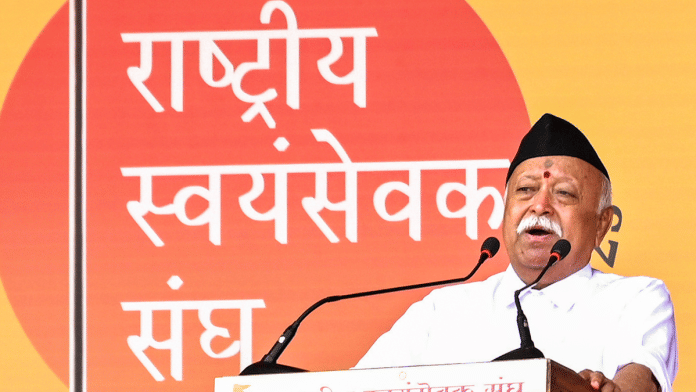New Delhi: Warning against the ‘grammar of anarchy’, Rashtriya Swayamsevak Sangh (RSS) chief Mohan Bhagwat said that revolutions like those in Nepal, Sri Lanka and Bangladesh only bring instability and such turmoil weakens nations and creates space for foreign interference.
Bhagwat said of the recent unrest in Nepal, during his Vijaydashami and centenary celebration address from the RSS headquarters in Nagpur Thursday, “In recent years, there has been considerable turmoil in our neighbouring countries. The regime change in Sri Lanka, Bangladesh, and, more recently, Nepal due to violent outbursts of public anger is a concern for us.”
Expressing concern over such regime changes in these countries, Bhagwat said violent public uprisings in these countries could pose a risk for India.
The RSS chief said the forces wanting to create such disturbances in Bharat are active inside as well as outside our country, but stressed the fact that violent outbursts cannot bring about a desirable change.
Bhagwat went on to say, “BR Ambedkar calls such a movement ‘grammar of anarchy”.
The RSS chief said that the government must be people-oriented to avoid such chaos, too.
“The natural and immediate causes for discontent are the disconnect between the government and society and the lack of able and people-oriented administrators. However, violent outbursts do not have the power to bring about the desirable change. The society can achieve such transformation only through democratic means.”
Bhagwat went on to say that no revolution born out of such upheaval has fully achieved its goals, referring to France during Napoleon’s reign: “Check history. No revolution has fulfilled its objective… So many so-called socialist movements happened, but now all these socialist countries are now capitalist…”
Bhagwat said in such violent circumstances, there is a possibility that dominant powers of the world try to find “opportunities to play their own games.”
In September, Nepal witnessed one of the most deadly protests that originally began as a Gen Z movement. What started as a peaceful protest against government corruption and the ban on multiple social media platforms quickly escalated, eventually leading to regime change.
“These neighbouring countries are linked with Bharat based on both culture and long-standing ties between citizens. In one way, they are part of our own family. Peace, stability, prosperity, and ensuring comfort and well-being in these countries is a necessity arising out of our natural affinity with these countries, going beyond the consideration for protection of our interests,” he added.
(Edited by Insha Jalil Waziri)
Also Read: Modi on 100 years of RSS—’Sangh synonymous with patriotism, service since inception’






